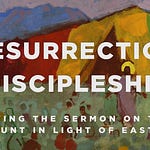Gracious and truthful God,
we come to your Word today with practiced sincerity and carefully curated honesty.
We have learned how to sound trustworthy, even when we’re not.
We have learned to speak in half-truths, omissions, and polite deceits
not always to deceive others, but to protect ourselves.
But you, O Lord, are not fooled by our oaths or performances.
You see through the religious polish and into the places we keep hidden.
So speak to us now, not with condemnation, but with clarity.
Disrupt our habits of hiding.
Interrupt the spinning stories we tell ourselves.
Undo the fear that keeps us from being honest.
Let your resurrection Word come alive in us.
Make us whole, so that our words might be true.
Let your grace make us bold enough to live unmasked,
and faithful enough to trust your “yes” is already spoken over us.
We pray this in the name of Jesus,
who tells the truth about us and loves us still.
Amen.

Remember, as children, when we would do our best to convince our friends or parents that we were telling the truth?
“I swear to God!”
“Cross my heart, hope to die! Stick a needle in my eye.”
Some of us might have even thrown in a metaphorical stack of Bibles to really lay on the convincing.
We have built overpromising, over-explaining, and over-swearing vocabularies because many suspect no one actually believes us when we say what we mean. And this is probably fair, as we do not trust ourselves half the time.
But Jesus says, “Let your yes be yes, and your no be no.”
Pretty simple.
No add-ons, pinky promises, or needles in the eye.
No religious jargon to make it sound holier than it is.
You might hear this and think, “That’s cute, Jesus, but have you met the people in my life? You might not understand how things really work. In this world”
To this, Jesus replies, “Yes, but I am calling you to a different one.”
Let’s be honest: many of us have built our lives on strategic ambiguity.
We soften the truth.
We spin it.
We weaponize silence.
We have learned to perform sincerity without living it.
We live in a world where trust is rare and “fake news” is rampant, so we tell ourselves we have no choice but to dress up our words to make them more believable.
That is not a communications problem; it is a soul problem.
A fracture in our ability to live whole lives.
And Jesus knows it.
This passage from the Sermon on the Mount is not Jesus’ attempt to micromanage our vocabulary. Jesus confronts the fractured human condition: our deep fear of being seen, known, and accountable. Jesus is not banning oaths in courtrooms or before congressional subcommittees. He is saying, “If your regular speech cannot be trusted, something is wrong!”
Dietrich Bonhoeffer put it like this:
“The very existence of oaths is a proof that there are such things as lies.”[i]
Another way to say it would be that we only need to swear oaths because we assume we are constantly being lied to. People lie, and so do we.
The lie, according to Bonhoeffer, hides itself behind the oath. What was once intended to protect the truth has turned into a hiding place for deceit.
Jesus is not fooled by our pledges with a sprinkle of religiosity. Jesus wants our wholeness, not our verbal gymnastics, because wholeness in Christ leads to holiness.
“Complete truthfulness,” writes Bonhoeffer, “is really only another name for the totality of discipleship.”[ii]
“Let your yes be yes, and your no be no” is not a new legal code handed down by Christ. Instead, Jesus is pointing to a resurrection reality: being a human being does not require a mask, manipulation, or performance.
Because here’s the truth:
We lie because we are afraid.
We have tricked ourselves into believing that grace cannot cover what is actually true.
We perform because we have forgotten that we are already known and loved.
Jesus tells us, “You do not have to live fractured anymore.
The resurrection is God’s great unmasking. It tells the truth to us in all our brokenness. But it also tells us the truth about God: that we are loved, forgiven, and can hold onto the promise that we have been raised to new life. The resurrection life is the life where we can stop hiding.
The resurrection is not just something that happened to Jesus. It is something that is continually happening to all of creation.
In the light of Christ’s resurrection, truthfulness means:
We do not have to protect ourselves with oaths because ultimately, God is our protector.
We do not have to spin the truth because the grace of God has already dealt with the things we think we need to spin.
We do not have to manipulate or overcome outcomes because we live under a deeper “yes,” the “yes” of Christ’s victory over sin and death.
And let’s be clear: this is not blanket, divine permission to become brutally honest jerks who say, “I’m just being honest” while destroying others. That is not resurrection; that is narcissism. Or, as Taylor Swift might put it, “casually cruel in the name of being honest.”[iii]
Because of Christ’s resurrection and God’s grace-filled “yes” to us, truthfulness for followers of Jesus is always graceful, but never fake. Honest, but never cruel.
Jesus is not just telling us to “be honest.” Moral gold stars are not being handed out for telling the truth on our taxes and avoiding gossip. If that is all Jesus is after, then it is just another way for religious folks to feel superior as the onlooking world rolls its eyes.
Bonhoffer once more:
“Complete truthfulness is only possible when sin has been uncovered, and forgiven by Christ.”[iv]
And that’s it. Truthfulness, honesty, is not the fruit of spiritual discipline. It is the fruit of forgiveness.
You do not become honest by trying harder.
You become honest when you know you are already known.
Already seen.
The fake news we are most tempted to believe is not about others. It is about ourselves.
That if the truth came out, we would be abandoned.
Exposed.
So we lie.
We spin.
We control the narrative.
And Jesus says, “You do not have to do that anymore.”
The resurrection of Christ, promised to us, tells the truth about us.
And thanks be to God, because it is worse than we thought but still more hopeful than we imagined.
At the end of the day, “Let your yes be yes, and your no be no,” is about trust. Not just people trusting you but also us trusting God enough to stop performing.
Jesus says, “Let your yes be yes, and your no be no.”
Because his yes, spoken from the cross and shouted from the empty tomb, has already been declared over you.
Amen.
[i] Dietrich Bonhoeffer, The Cost of Discipleship, 1937Page 136
[ii] Bonhoeffer. Page 138.
[iii] Swift, Taylor. All Too Well.
[iv] Bonhoeffer. Page 138.














Share this post